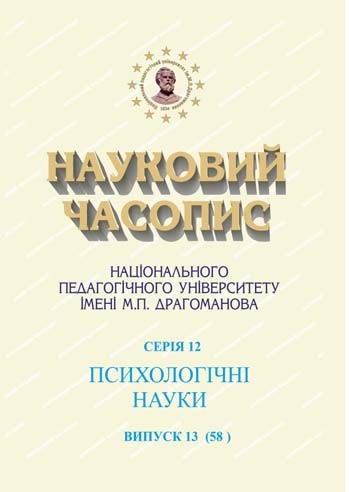PSYCHOLOGICAL FACTORS OF STUDENTS’ COMMUNICATION IN THE INTERNET AREA
DOI:
https://doi.org/10.31392/NPU-nc.series12.2021.13(58).01Keywords:
communication, level of sociability, emotional barriers, student age, internet area, virtual communicationAbstract
The article is devoted to the study of the peculiarities of communication of student youth in the Internet area. Modern views on real and virtual communication in students’ lives are analyzed. The psychological features of Internet communication are revealed. The psychological factors of online communication are generalized and systematized. In order to study the features of virtual communication the methods of “Diagnosis of the general level of sociability”, test “Diagnosis of emotional barriers in interpersonal communication”, test “Diagnosis of communication needs”, questionnaire “Internet perception” are used as well as observation and correlation analysis. Communication is defined as a multifaceted process of establishing and developing contacts between people, which involves the exchange of information, certain tactics and strategies of interaction, perception and understanding of each other. Internet communication combines four processes: the creation of a new reality, the reflection of objective reality, the expression of the subjective and personal world of the interlocutors, the transmission of its spiritual content to all participants. It is revealed that the conditions in which virtual communication takes place are significantly changed in comparison with the conditions of real communication: anonymity, originality of interpersonal perception processes in the absence of nonverbal information, voluntariness and desirability of contacts, difficulty of emotional component of communication. In the course of our research the following psychological factors of Internet communication of youth are revealed: the satisfaction of need in search of the information, entertainment, rest, communication, training; the overcoming emotional barriers in interpersonal interaction; the need for sensory stimulation; the loss of sense of time; low level of sociability in real life; projecting reality into an online space; change of consciousness as a result of the use of cybersport. Based on the results of empirical research and correlation analysis, it is defined that the general level of sociability, emotional barriers in interpersonal communication and altered states of consciousness as a result of the Internet use can be considered as interdependent and mutually reinforcing factors, between which there is a significantly close connection.
References
- Andreeva, G.M. (2008). Sotsialnaya psihologiya: uchebnik dlya vuzov. [Social psychology: student book for universities]. Moskva : Aspekt Press [in Russian].
- Bondarovska, V. (2005). U merezhi Internet: psykholohichni, etychni, kulturolohichni problemy. [On the Internet: psychological, ethical, cultural problems]. Psykholoh – Psychologist, 25, 10–15 [in Ukrainian].
- Voyskunskiy, A.E. (2004). Aktualnyie problemyi psihologii zavisimosti ot Interneta. [Actual problems of the psychology of Internet addiction]. Psihologicheskiy zhurnal - Psychological Journal, 1, 90–100 [in Russian].
- Zhichkina, A.E. (1999). Sotsialno-psihologicheskie aspektyi obscheniya v Internete. [Socio-psychological aspects of communication on the Internet]. Retrieved from: http://flogiston.ru/articles/netpsy/refinf [in Russian].
- Ignateva, E.A. (2009). Psihologicheskie treningi razvitiya sposobnostey virtualnogo obscheniya. [Psychological trainings for the development of virtual communication skills]. Psihologicheskaya nauka i obrazovanie – Psychological Science and Education, 2, 82–85 [in Russian].
- Latsanych, O.L. (2000). Spilkuvannnia yak osoblyvyi vyd diialnosti. [Communication as a special activity]. Naukovyi visnyk Uzhhorodskoho derzhavnoho universytetu. Ser. Pedahohika. Sotsialna robota – Scientific Bulletin of Uzhhorod State University. Ser. Pedagogy. Social Work, 3, 48–49 [in Ukrainian].
- Motsyk, R.V. (2015). Internet-zalezhnist ta yii vplyv na vykhovannia suchasnoi liudyny. [Internet addiction and its impact on the education of modern person]. Pedahohichna osvita: teoriia i praktyka – Pedagogical education: theory and practice, 18, 292–297 [in Ukrainian].
- Nemesh, O.M. (2017). Virtualna diialnist osobystosti: struktura ta dynamika psykholohichnoho zmistu. [Virtual activity of personality: structure and dynamics of psychological content]. Kyiv : VD «Slovo» [in Ukrainian].
- Chudova, I.V. (2002). Osobenosti obraza «Ya» «zhitelya Interneta». [Peculiarities of the image of «I» of the «inhabitant of the Internet»]. Psihologicheskiy zhurnal – Psychological Journal, 23(1), 113–118 [in Russian].
- Iusupova, N.O. (2009). Mizhosobystisni stosunky studentiv v aspekti virtualnoi vzaiemodii. [Interpersonal relations of students in the aspect of virtual interaction]. Praktychna psykholohiia i sotsialna robota – Practical Psychology and Social Work, 4, 78–80 [in Ukrainian].
- Caroline, Flisher, (2010). Getting plugged in an overview of internet addiction. Journal of Paediatrics and Child Health, 46(10), 557–559.
- Fredrickson, B.L. (2013). Positive emotions broaden and build. Advances in Experimental Social Psychology, 47, 1–53.
- Kebritchi, M., Lipschuetz, A., & Santiague, L. (2017). Issues and challenges for teaching successful online courses in higher education: А literature review. Journal of Educational Technology Systems,46(1), 4–29.
- Sun, A., & Chen, X. (2016). Online education and its effective practice: A research review. Journal of Information Technology Education, 15, 157–190.
- Young, K.S. (2000) Internet Addiction Test.
Retrieved from: http://www.netaddiction.com/resources/internet_addiction_test.htm

